Here’s What 29 Million Tweets Can Teach Us About Brexit
Britain’s vote to leave the European Union caused a dramatic surge in Brexit-related tweets. Our analysis of millions of them provides key insights into the success of the “leave” campaign, the surprising dominance of economic issues in the online debate, and the referendum’s increasingly global audience.
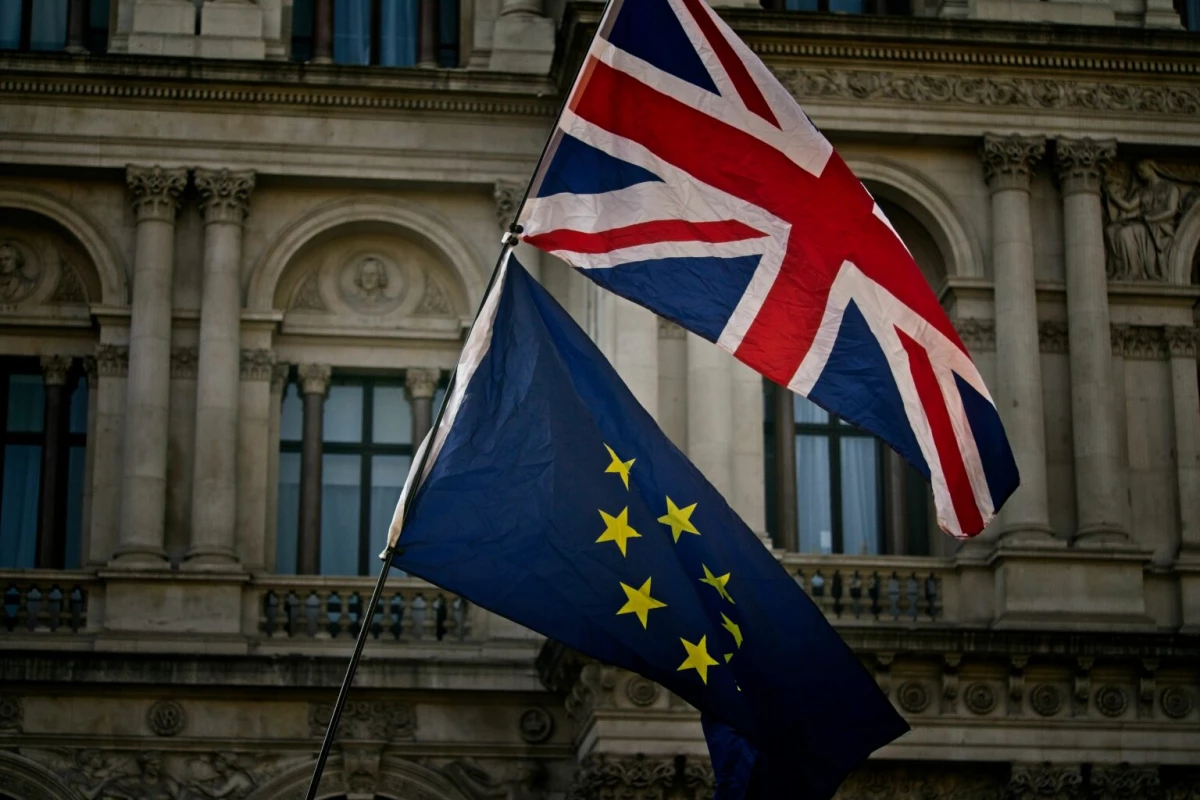
Credit: 89 Initiative
Authors
Area of Study
Tags
This article was originally published at The Washington Post.
As Britain’s vote to leave the European Union sent pundits scrambling and the pound plummeting, it also set off a global frenzy on social media. Topping off months of online campaigning, the days leading up to the vote saw a dramatic surge in Brexit-related tweets and posts by celebrities, ordinary citizens and even automated bots.
We all know by now that pollsters and prediction markets missed the mark in forecasting the June 23 vote. So what — if anything — can social media data teach us about the motivations of Brexit voters and the global ramifications of the referendum?
Unfortunately, social-media users are not representative samples of the population. Textual analysis of the data that they produce is often plagued by the linguistic complexities of sarcasm and slang. Nonetheless, social-media platforms provide organic and immediate sources of big data that offer valuable perspective on how the public engages with issues over time.
In particular, analysis of more than 29 million tweets collected at NYU’s Social Media and Political Participation (SMaPP) Lab provides key insights into the success of the “leave” campaign, the surprising dominance of economic issues in the online debate, and the referendum’s increasingly global audience.
For almost five months on Twitter, ‘leave’ was more popular than ‘remain’
Recent analyses suggest that the “leave” campaign was more vocal than its rival across all social-media platforms. Our data indicate that its dominance on Twitter dates back to February 2016. In fact, the number of tweets containing the term “leave” was nearly double the number containing “remain” across the entire period. The figure below highlights this leave-remain gap, as well as the massive spike in Brexit-related tweets as the vote approached.
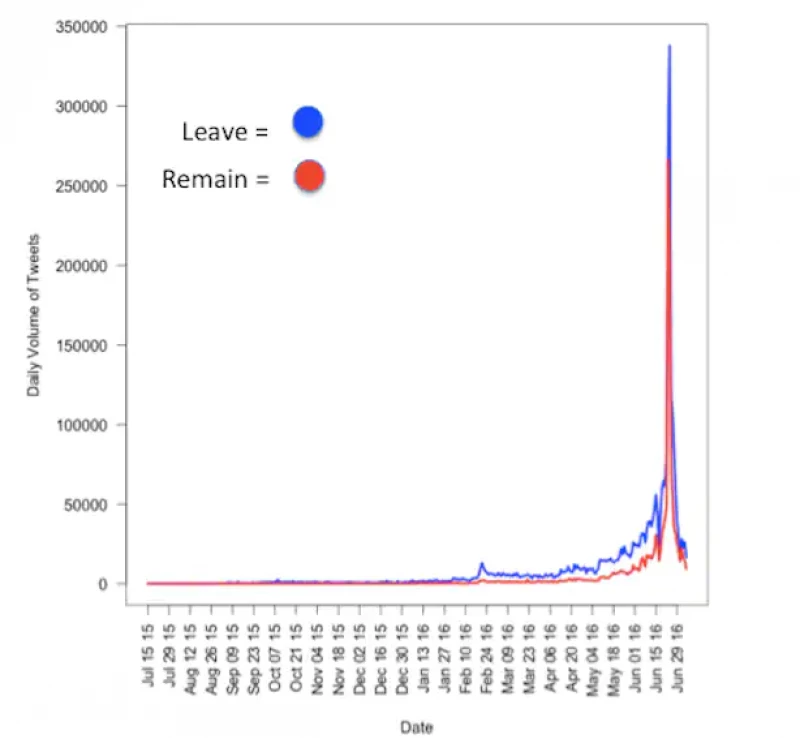
On one hand, this gap could be due to the fact that the term “Brexit,” which we used to filter our data collection, may be biased toward “leave.” On the other hand, given that the population of Twitter users is heavily biased toward young and educated citizens, a group that tended to lean “remain,” the discrepancy is still striking.
Further evidence of this gap appears in the top words and phrases tweeted in the period preceding the Brexit vote. As our data report indicates, pro-Brexit messages were more common than those mentioning remain. Hashtags such as #strongerin or #votein were significantly less popular than #voteleave or #leaveeu.
Geographic lines between ‘remain’ and ‘leave’ were quite blurry
Pundits were surprised that many regions predicted to vote “remain” in large numbers only won by narrow margins on the day of the referendum. However, geolocated Twitter data suggested that there was a great deal of geographic overlap between users tweeting “leave” and those tweeting “remain.” This finding is visualized in the almost identical figures below. Although geolocated data only represents a small fraction of the total set of tweets, a similar pattern emerges when analyzing users’ self-reported location data.
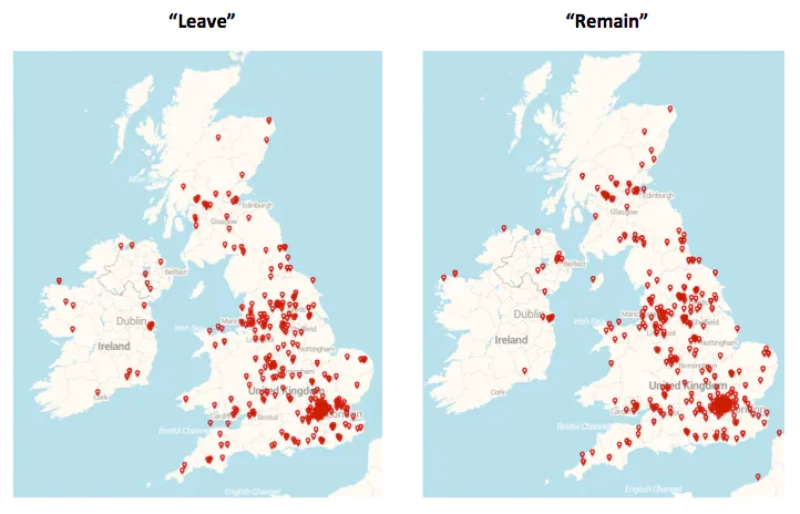
The economy, not immigration or sovereignty, dominated the discussion
Our data also suggest that discussions of the economy — rather than immigration or sovereignty — dominated the online conversation about Brexit. The figure below shows the daily volume of Brexit-related tweets referencing each of these three issues over the past year. In the days directly leading up to the vote, the economy was a much more popular topic than immigration. As our data report outlines, the economy was even widely discussed among “leave” voters, suggesting that the pro-Brexit Twitter campaign wasn’t relying entirely on jingoistic fearmongering; it propagated more pragmatic messages as well.
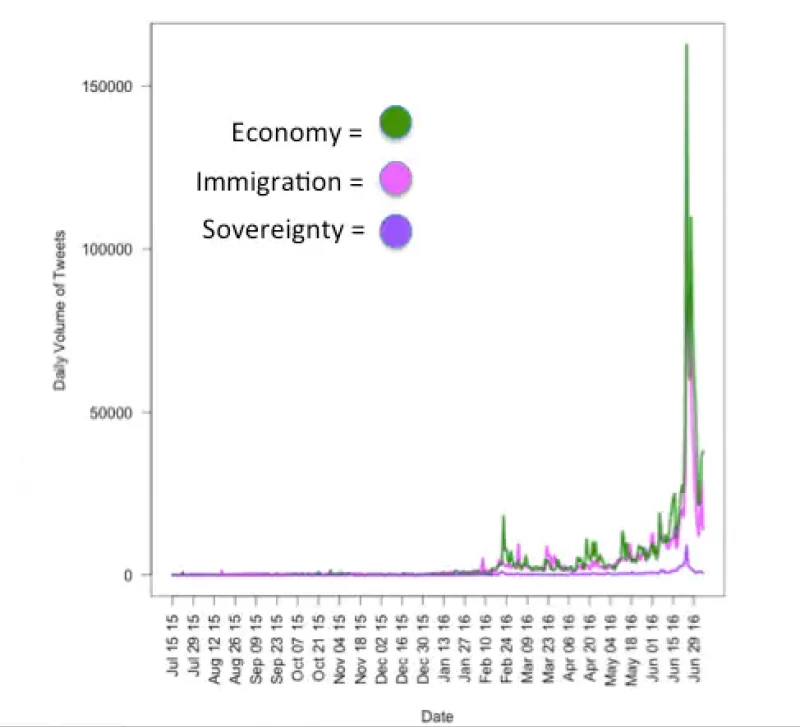
‘Brexit’ became an increasingly global hashtag
Although online discussions of Brexit were primarily concentrated in the United States and Europe, as the vote neared, interest became increasingly global. The international reach of Brexit tweets can be seen in the map below.
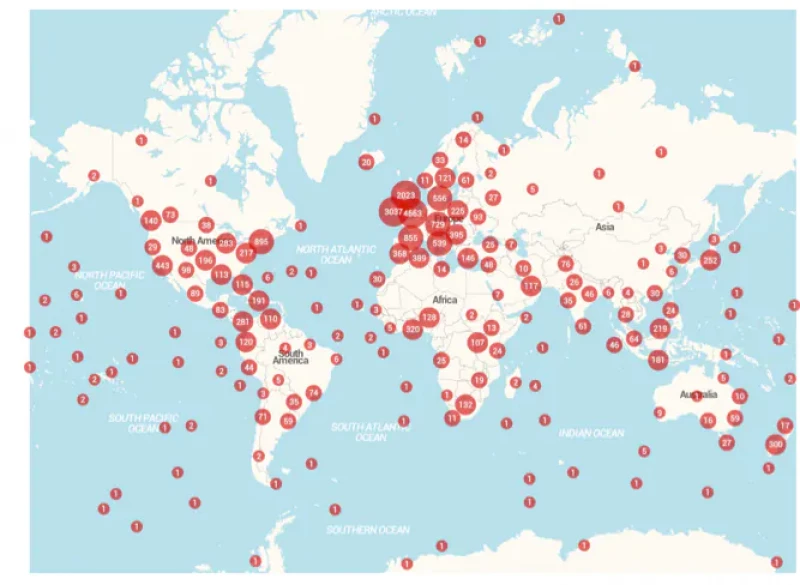
Diverse languages were also popular in each period. In the months preceding the vote, four non-E.U. languages made the top 15: Indonesian, Turkish, Japanese and Russian. During the vote, Thai also reached the top 15 and remained popular after the vote. Across all three periods, “Brexit” tweets appeared in a wide variety of European languages, from Greek to Swedish.
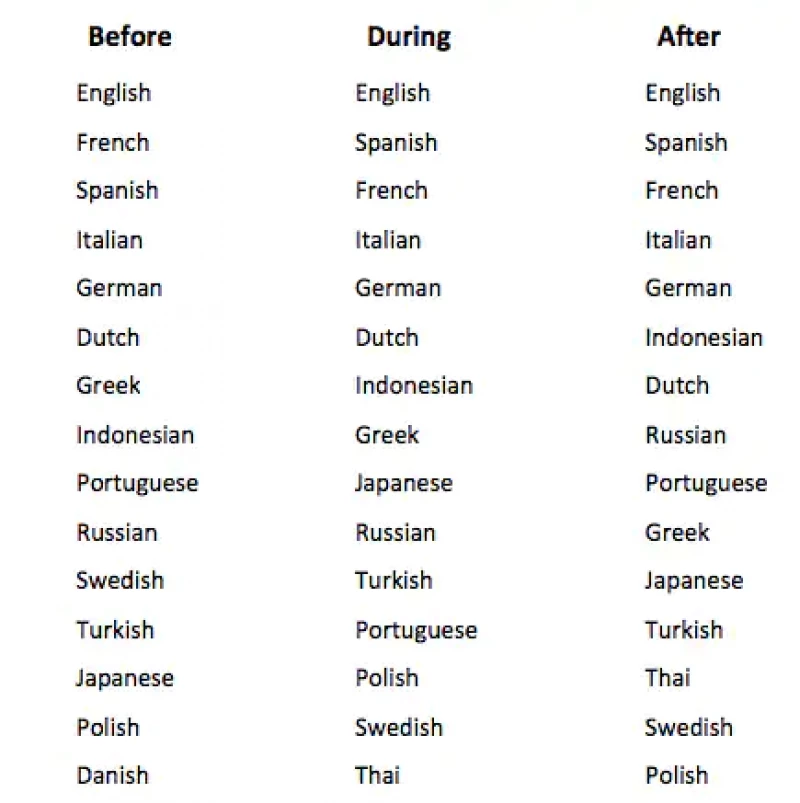
Celebrities, ordinary ‘tweeps,’ and jokes dominated the ‘Brexit’ discussion
Finally, examining the top Brexit-related retweets provides a cautionary tale. In the period leading up to the referendum, the most retweeted content came from celebrities and ordinary Twitter users, not from political figures. For example, top retweets in the days preceding the vote came from Harry Potter author @jkrowling, actress @ElizabethHurley, actor @StephenMangan, and a member of the British alternative rock band @TrumanBlack.
On the day of the vote, the top retweets were primarily jokes such as “Dear Britain, This Brexit vote is all wrong. If you want to leave the E.U., dump some tea in the harbor and fight a war. Sincerely, America” or “A Brexit vote would be historic because England usually exits Europe on penalty kicks.” Despite the gravity of the referendum, the most widely disseminated content made a mockery of the process.
Journalists and politicians have only recently begun to dominate the Twitter conversation about Brexit since the vote.
Preliminary conclusions
While hindsight is always 20-20, our data suggest that the “leave” campaign was consistently more popular than “remain” on Twitter, dating to February. Furthermore, preliminary analysis of location data indicates that regions that had polled as solidly “remain” may have been more divided. Additionally, our observation that discussions of the economy were almost as popular as mentions of immigration and border security among those tweeting “leave” could suggest that the pro-Brexit Twitter camp was reaching a wider base than the anti-immigrant constituency.
The referendum’s large European — and increasingly global — audience indicates that the vote has had key ramifications for public opinion across Europe. That should be monitored closely in the coming months.
Finally, the fact that journalists, policy organizations and trusted elites did not begin to dominate the Twitter conversation until after the vote raises caution about the ability of social media to inform the public on issues of public policy. The content produced by reputable sources may not be as catchy as celebrity tweets or funny memes. It is certainly possible that other forms of social media that allow for posts of more than 140 characters may have played a different role in the leadup to the Brexit vote.
Nevertheless, as more people come to rely on social media for political information, it is worth keeping an eye on the quality of that information.
Alexandra Siegel is a graduate student researcher in the New York University Social Media and Political Participation (SMaPP) Lab and a PhD candidate in the Wilf Family Department of Politics at NYU. The full SMaPP Data Report on which this post is based is available here.